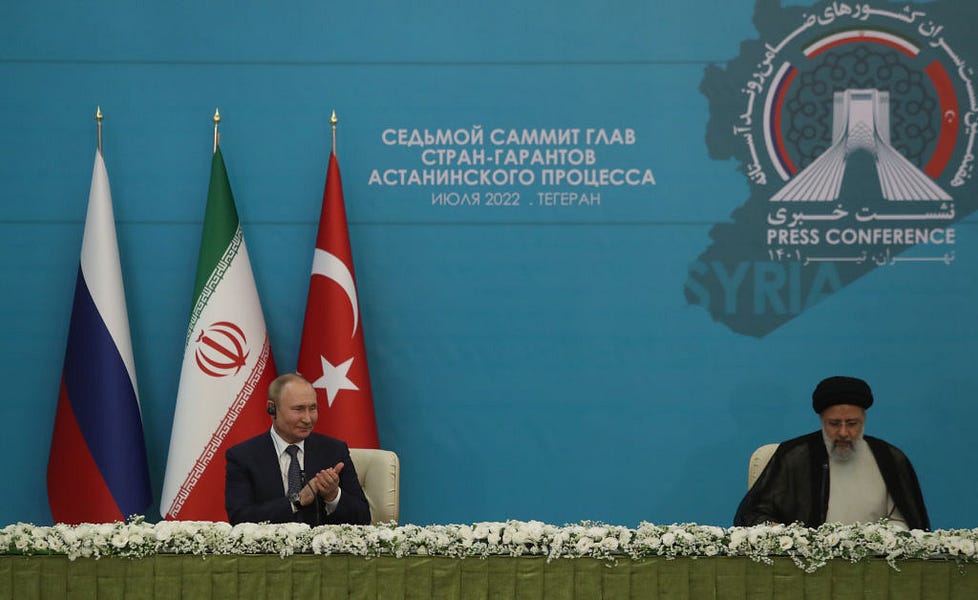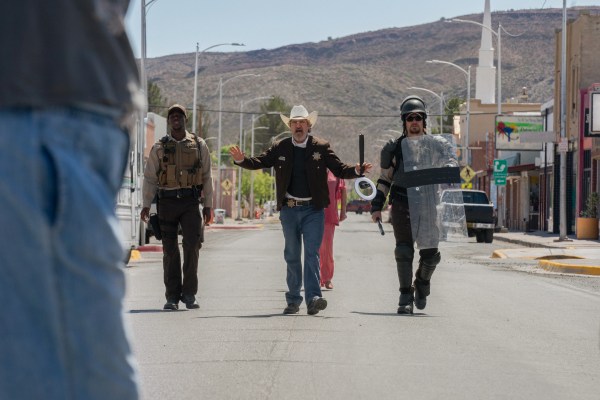“We stand five minutes or five seconds from the finish line,” declared Russian envoy Mikhail Ulyanov on Sunday to reporters camped outside renewed Iran nuclear negotiations in Vienna. But if reports emerging from the latest round of talks are accurate, Iran and Russia may stand five minutes from their strategic finish line, with the United States and its allies five minutes from disaster.
Just five months ago, following Russia’s invasion of Ukraine, questions mounted in Washington concerning why a man tapped by Moscow to negotiate a nuclear deal favorable to both Russia and Iran was at the center of negotiations with the United States and its Western European allies. Five months later, with Russian atrocities in Ukraine mounting, Ulyanov’s re-emergence at the center of the Vienna talks should reactivate alarm bells among American policymakers and Ukraine supporters around the world.
Late last year, with Tehran racing forward with its nuclear program despite the Biden administration’s pullback from maximum pressure and offer to rejoin the 2015 Joint Comprehensive Plan of Action (JCPOA), U.S. Special Envoy for Iran Rob Malley enlisted Moscow’s assistance in brokering terms that might be more amenable to the mullahs. Under a new deal, Iran would receive $275 billion of sanctions relief in the first year and $1 trillion by 2030, including the lifting of U.S. terrorism sanctions imposed on the top financiers of a group President Joe Biden recently reaffirmed as a terrorist organization: the Islamic Revolutionary Guard Corps (IRGC).
Tehran would face no changes in the old deal’s sunset clauses—that is, expiration dates on key restrictions—and would be allowed to keep its newly deployed arsenal of advanced uranium centrifuges in storage, guaranteeing the regime the ability to cross the nuclear threshold at any time of its choosing. As with the 2015 agreement, Iran would face no restrictions on its development of nuclear-capable missiles, its proliferation and sponsorship of terrorism throughout the Middle East, and its abuse of the Iranian people. And worst of all, Iran would win all these concessions while actively plotting to assassinate former U.S. officials like John Bolton, Mike Pompeo and Pompeo adviser Brian Hook, and trying to kidnap and kill Iranian-American journalist Masih Alinejad on U.S. soil.
Moscow, meanwhile, would receive billions of dollars to construct additional nuclear power plants in Iran, and potentially more for storage of nuclear material. The fate of U.S. sanctions blocking the transfer of Russian arms to Iran remains unknown, despite U.S. Defense Department reports attesting to Tehran’s interest in buying fighter aircraft, main battle tanks, air defense systems, and coastal defense systems from Moscow.
That’s where the deal stood in March. The Iranian-Russian strategic relationship has grown since then. Following a visit by Russian President Vladimir Putin to Tehran last month, Iran reportedly started transferring armed drones for Russian use against Ukraine. On Tuesday, Putin launched an Iranian satellite into orbit reportedly on the condition that Moscow can task it to support Russian operations in Ukraine.
With American and European sanctions on Russia escalating, particularly with respect to Russian energy sales, Putin may finally see net value in the U.S. lifting of sanctions on Iran’s financial and commercial sectors. While the return of Iranian crude to the global market could lead to a modest reduction in oil prices, thereby reducing Putin’s revenue, Russia may be able to head off U.S. secondary sanctions by routing key transactions through Tehran. After all, what would the Biden administration do if Iran allowed Russia to use its major banks and companies to bypass Western sanctions? Tehran would threaten to restart uranium enrichment if Washington reimposed sanctions on entities given sanctions immunity under a nuclear deal—providing Putin with a way out of the tightening economic noose he faces.
Although Washington is offering Tehran the deal of the millennium, Iran and Russia masterfully played for even more concessions. Iran announced it would not accept any deal unless the United States removed the IRGC from the State Department’s list of foreign terrorist organizations—a designation that forces visa denials for all IRGC affiliates and criminal penalties for those providing the group with material support. Following a backlash from Congress and Gold Star families, Biden rejected Iran’s demand. Last month, ahead of nuclear talks in Doha, Tehran floated a compromise: remove U.S. terrorism sanctions from the IRGC’s largest business conglomerate, Khatam al-Anbiya. Unlike the IRGC designation, the American side did not publicly reject this direct sanctions relief request for the IRGC. The issue didn’t reappear last weekend in Vienna, though its status remains unknown.
Possibly pocketing yet another victory, Iran came to Austria with a new ultimatum: It would not accept any deal unless the International Atomic Energy Agency (IAEA) shuts down its nearly four-year-old investigation into secret nuclear sites and materials never disclosed by Iran to the agency. Tehran, of course, was supposed to come clean about its past work on nuclear weapons as a pre-condition for the JCPOA in 2015, but the deal established an artificial deadline for a perfunctory IAEA report to clear the JCPOA’s path forward—turning a blind eye to Iranian deception. In 2018, however, Israel discovered Iran was hiding a nuclear weapons archive—a library of the regime’s work to build nuclear weapons with memos indicating Iran planned to return to weaponization in the future.
In 2019, the U.S. Treasury Department imposed sanctions on nuclear weapons scientists still working for a secret nuclear-military organization then-headed by Mohsen Fakhrizadeh, the founder of Iran’s nuclear weapons program who was killed in Iran the following year. By 2021, the world would learn that U.N. inspectors had discovered four undeclared nuclear-related sites inside Iran with three sites testing positive for the presence of uranium. Commercial satellite imagery of at least two of those sites showed Iran moving equipment into containers and conducting sanitization work to cover its tracks.
In an earth-shattering report to the IAEA Board of Governors at the end of May, Director General Rafael Grossi lifted the veil on his investigation, all but concluding Iran was in breach of its obligations under the Nuclear Non-Proliferation Treaty (NPT) to declare nuclear material and activities to the agency. In June, the U.S. and key allies supported a censure resolution urging Iran to fully cooperate with the IAEA investigation and answer all outstanding questions. According to Grossi, Iran’s answers to date are not “technically credible.”
To shut down this probe—turning a blind eye to Tehran’s violation of the NPT—would guarantee that Iran’s pursuit of nuclear weapons remains unchanged. It would also render any nuclear deal complete folly. Such an accord may purport to provide robust verification of Iran’s nuclear program, but would lack the ability to verify the clandestine aspects of the regime’s activities.
This result would make Russia happy as well. Moscow has long played the role of antagonist inside key arms control-related UN agencies, including the IAEA and the Organization for the Prohibition of Chemical Weapons (OPCW). Undermining the independence and integrity of international agreements like the NPT or the Chemical Weapons Convention serves Moscow’s agenda—giving Putin a freer hand to breach his own international commitments. This is why Russia has ardently defended Iran at the IAEA—voting against censure resolutions and pushing back on investigations—while defending Syria at the OPCW.
Advocates of the Biden administration’s approach will argue that any deal is better than no deal at all. Iran’s nuclear program is so far advanced that the agreement’s concessions—including a trillion dollars in sanctions relief to fund terrorism and longer-range missiles, acceptance of clandestine nuclear activities inside Iran, huge financial windfalls for Putin, and tacit approval of plots to kill Americans—are worth a few years to delay a nuclear crisis that might force military action. According to this reasoning, while the sunset provisions of the old deal may not change, those sunsets don’t fully expire until 2031—so there’s still time.
That’s not true, however. From 2010 to 2012, Congress enacted a series of laws imposing sanctions on Iran’s central bank and a number of economic sectors in Iran. Since the JCPOA was never submitted as a treaty and these laws were never repealed, the up-front sanctions relief provided to Iran was built on the President issuing national security waivers to Congress—continuously suspending various sanctions laws every few months by sending notifications to Capitol Hill. To get Iran to agree to that arrangement, the deal also required the United States to “seek such legislative action as may be appropriate” to repeal the underlying statutes by October 2023.
With 175 House Republicans already pledging to fight a new Iran deal, and with Republicans expected to control the House next year, that outcome is all but impossible. Iran could view a failure to comply as a breach of U.S. commitments, prompting renewed threats of enrichment. In other words, Iran would get this deal and then come back in just over a year to shake down the West for even more. The crisis may not wait until 2031—it may arrive around the time President Biden must declare whether he’s seeking re-election.
That brings us back to Ulyanov and his “five minutes or five seconds from the finish line” comment. In this deal, Iran will most certainly reach its finish line, entering a strategic zone of immunity against the West in which the world’s leading state sponsor of terrorism will grow economically stronger and cross the nuclear threshold. Russia, too, will reach its finish line, acquiring additional military support for its Ukraine operations while establishing a much-needed sanctions evasion hub ahead of cutting energy supplies to Europe this winter.
America’s finish line entails both the end of U.S. efforts to prevent Iran’s acquisition of nuclear weapons and a catastrophic loss of leverage over Moscow in a must-win showdown to defend an American-led international order. And that puts us five minutes from disaster.
Richard Goldberg is a senior adviser at the Foundation for Defense of Democracies. He served on Capitol Hill, on the U.S. National Security Council, as the governor of Illinois’s chief of staff and as a Navy Reserve intelligence officer.






Please note that we at The Dispatch hold ourselves, our work, and our commenters to a higher standard than other places on the internet. We welcome comments that foster genuine debate or discussion—including comments critical of us or our work—but responses that include ad hominem attacks on fellow Dispatch members or are intended to stoke fear and anger may be moderated.
With your membership, you only have the ability to comment on The Morning Dispatch articles. Consider upgrading to join the conversation everywhere.